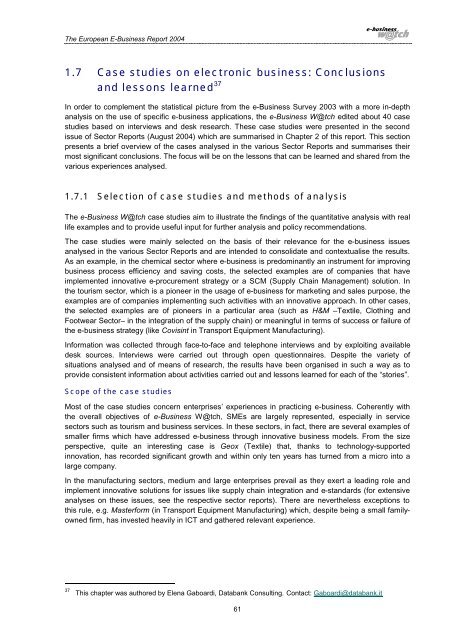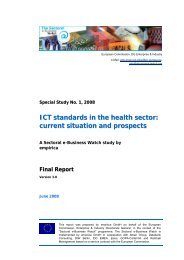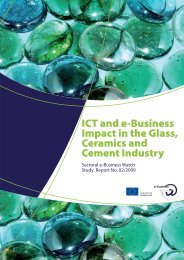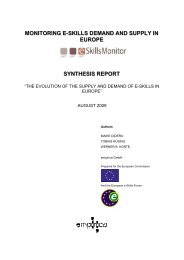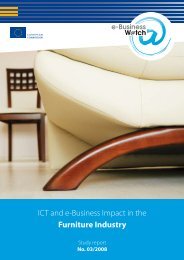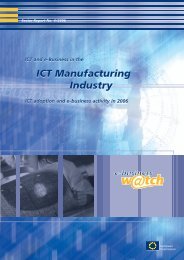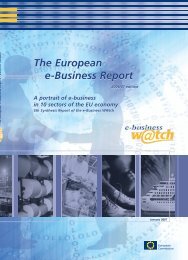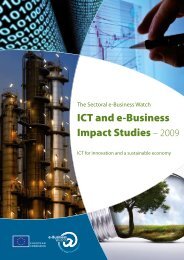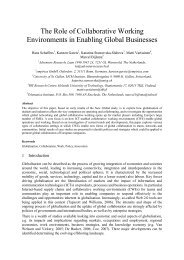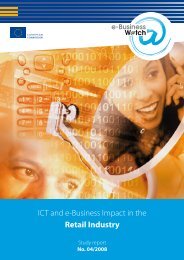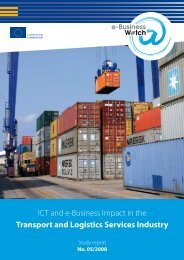The European e-Business Report 2004 - Berlecon Research GmbH
The European e-Business Report 2004 - Berlecon Research GmbH
The European e-Business Report 2004 - Berlecon Research GmbH
Create successful ePaper yourself
Turn your PDF publications into a flip-book with our unique Google optimized e-Paper software.
<strong>The</strong> <strong>European</strong> E-<strong>Business</strong> <strong>Report</strong> <strong>2004</strong>1.7 Case studies on electronic business: Conclusionsand lessons learned 37In order to complement the statistical picture from the e-<strong>Business</strong> Survey 2003 with a more in-depthanalysis on the use of specific e-business applications, the e-<strong>Business</strong> W@tch edited about 40 casestudies based on interviews and desk research. <strong>The</strong>se case studies were presented in the secondissue of Sector <strong>Report</strong>s (August <strong>2004</strong>) which are summarised in Chapter 2 of this report. This sectionpresents a brief overview of the cases analysed in the various Sector <strong>Report</strong>s and summarises theirmost significant conclusions. <strong>The</strong> focus will be on the lessons that can be learned and shared from thevarious experiences analysed.1.7.1 Selection of case studies and methods of analysis<strong>The</strong> e-<strong>Business</strong> W@tch case studies aim to illustrate the findings of the quantitative analysis with reallife examples and to provide useful input for further analysis and policy recommendations.<strong>The</strong> case studies were mainly selected on the basis of their relevance for the e-business issuesanalysed in the various Sector <strong>Report</strong>s and are intended to consolidate and contextualise the results.As an example, in the chemical sector where e-business is predominantly an instrument for improvingbusiness process efficiency and saving costs, the selected examples are of companies that haveimplemented innovative e-procurement strategy or a SCM (Supply Chain Management) solution. Inthe tourism sector, which is a pioneer in the usage of e-business for marketing and sales purpose, theexamples are of companies implementing such activities with an innovative approach. In other cases,the selected examples are of pioneers in a particular area (such as H&M – Textile, Clothing andFootwear Sector– in the integration of the supply chain) or meaningful in terms of success or failure ofthe e-business strategy (like Covisint in Transport Equipment Manufacturing).Information was collected through face-to-face and telephone interviews and by exploiting availabledesk sources. Interviews were carried out through open questionnaires. Despite the variety ofsituations analysed and of means of research, the results have been organised in such a way as toprovide consistent information about activities carried out and lessons learned for each of the “stories”.Scope of the case studiesMost of the case studies concern enterprises’experiences in practicing e-business. Coherently withthe overall objectives of e-<strong>Business</strong> W@tch, SMEs are largely represented, especially in servicesectors such as tourism and business services. In these sectors, in fact, there are several examples ofsmaller firms which have addressed e-business through innovative business models. From the sizeperspective, quite an interesting case is Geox (Textile) that, thanks to technology-supportedinnovation, has recorded significant growth and within only ten years has turned from a micro into alarge company.In the manufacturing sectors, medium and large enterprises prevail as they exert a leading role andimplement innovative solutions for issues like supply chain integration and e-standards (for extensiveanalyses on these issues, see the respective sector reports). <strong>The</strong>re are nevertheless exceptions tothis rule, e.g. Masterform (in Transport Equipment Manufacturing) which, despite being a small familyownedfirm, has invested heavily in ICT and gathered relevant experience.37This chapter was authored by Elena Gaboardi, Databank Consulting. Contact: Gaboardi@databank.it61


